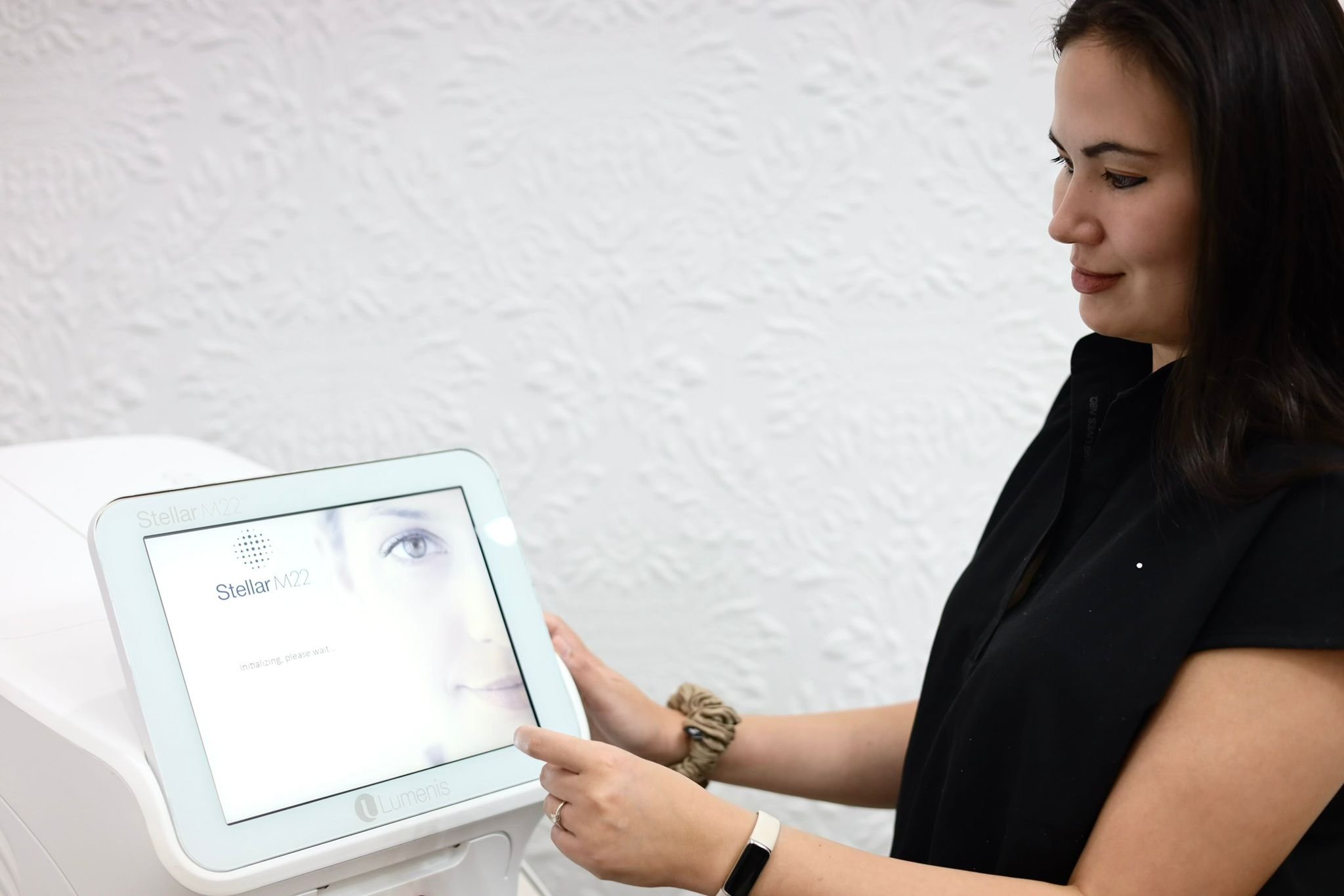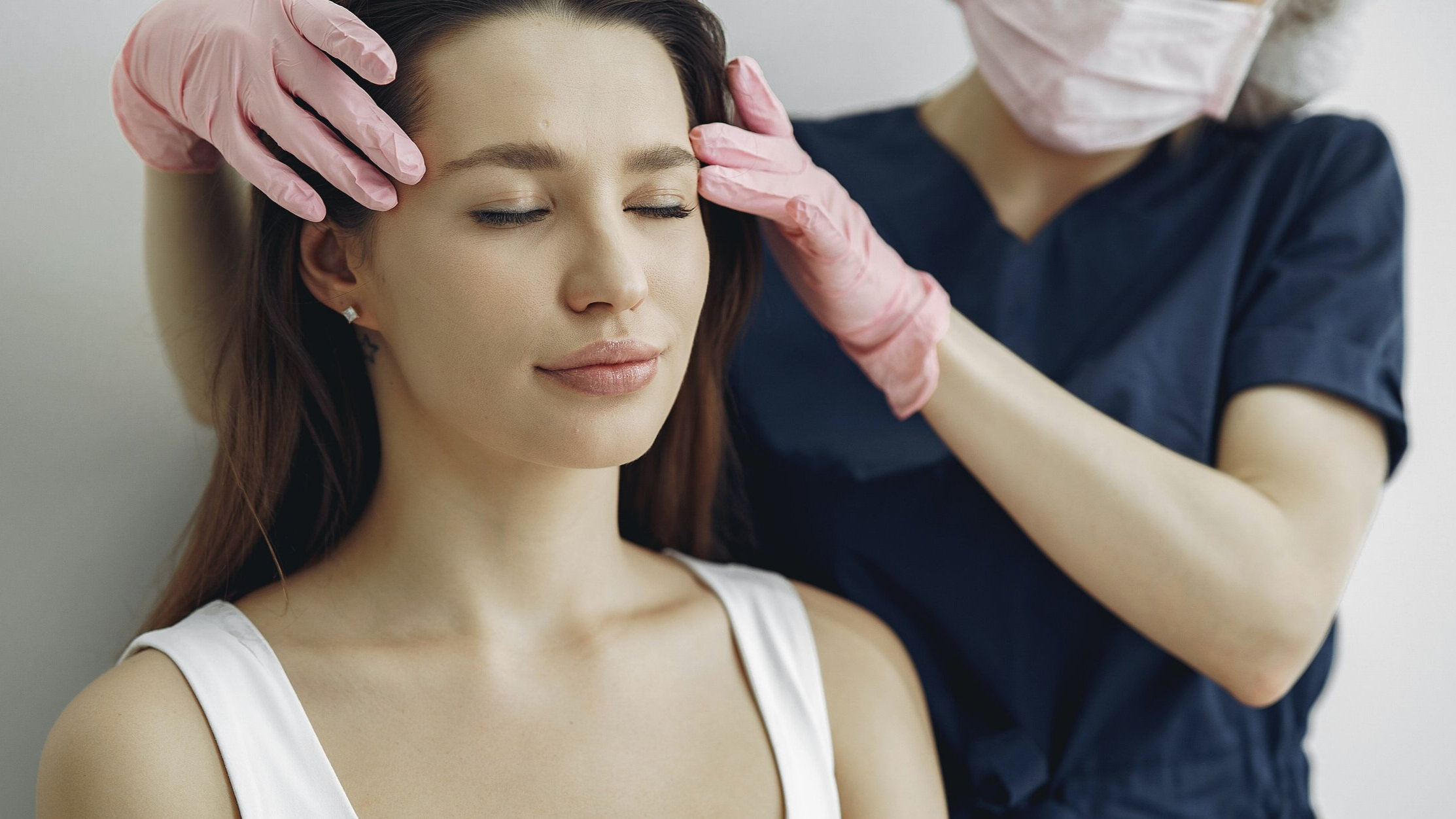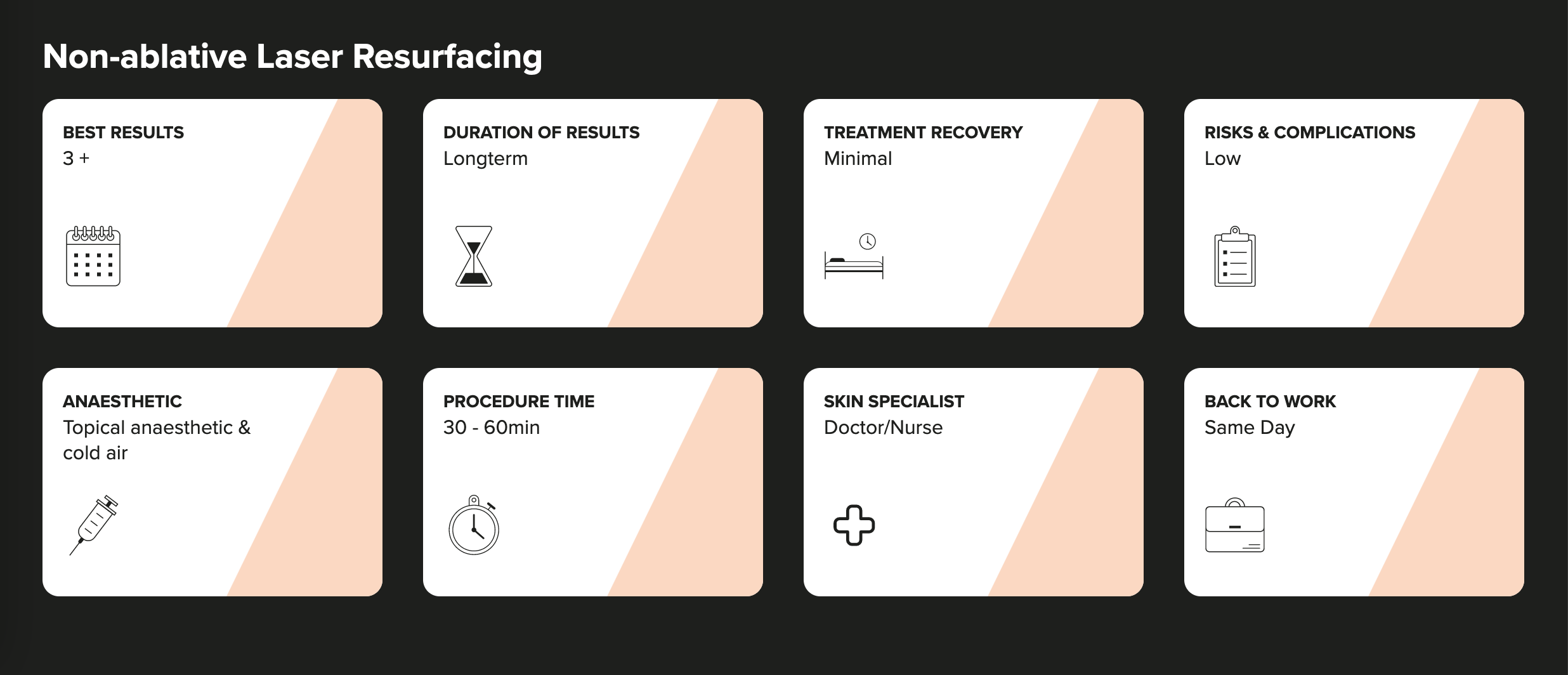
Light Treatments
Laser, IPL (Intense Pulsed Light), and LED (Light Emitting Diode) treatments are cutting-edge options in the world of skin care.
Laser treatments offer precision in resurfacing the skin and targeting concerns like wrinkles, texture, and scars.
IPL is known for its effectiveness in treating pigmentation and vascular lesions (capillaries or small veins in the face and legs, angiomas), as well as diffuse redness and rosacea.
LED light therapy, gentle yet effective, is used for acne treatment and promoting collagen production.
Each of these treatments harnesses the power of light to enhance and revitalise skin, offering solutions tailored to a variety of skin needs.
Laser Treaments
What can lasers do for you?
Non-ablative fractional lasers effectively treat wrinkles, sun damage, acne scars, enlarged pores, and uneven skin texture, while also improving skin tone and reducing pigmentation issues. Gentler than ablative lasers, they require minimal downtime, usually only causing mild redness or swelling. However, achieving optimal results may necessitate multiple treatments
You can read our article covering the basics of laser treatments in the Aesthetics Edit.
-
Laser is a technology that emits light through a process of optical amplification based on the stimulated emission of electromagnetic radiation. In the context of skin treatments, lasers are used for various cosmetic and medical procedures.
-
Lasers are used for a range of skin treatments, including reducing fine lines and wrinkles, treating sun damage, acne scars, enlarged pores, and uneven skin texture. They are also employed in improving skin texture and tone, addressing pigmentation issues like age spots, and more.
-
Common side effects of laser treatments include short-term redness and warmth of the skin, similar to a mild sunburn. In some cases, there might be temporary blistering and darkening of the skin. Dry skin and acne flare-ups, especially in younger individuals, can also occur.
-
While the risk of serious complications is generally low, potential risks include skin burns, changes in skin pigmentation, scarring, and in rare cases, infection. The risks can vary depending on the type of laser used, the area being treated, and the individual's skin type.
The most important thing to minimise your risk of side effects or complications is to follow pre- and post-care advice, and stay out of the sun!
-
Avoid sun exposure and false tanning products particularly in the 2 weeks before and after a procedure. Use a broad-spectrum SPF 50 sunscreen daily.
Use a skin preparation treatments as recommended by your practitioner for the two weeks before treatment, especially if you suffer from a history of pigmentation problems. Stop any really harsh active skincare ingredients at least 48 hours before treatment. Stop certain medications like aspirin, NSAIDs, and vitamin E supplements as advised. Undergo a patch test at least 48 hours before.
Refrain from strenuous exercise, hot showers, and baths immediately after treatment. Keep skin cool and moisturised. Monitor for and manage any potential flare-ups of conditions like cold sores.
It's important to follow the specific instructions provided by your practitioner, as pre- and post-treatment care can vary based on the individual and the specific laser treatment being performed.
Intense Pulsed Light (IPL)
What can IPL do for you?
Intense Pulsed Light (IPL) is a versatile and non-invasive treatment that harnesses the power of broad-spectrum light to address a variety of skin concerns. It's particularly effective for diminishing dark spots and pigment, reducing the appearance of rosacea, and blurring broken capillaries. IPL is also celebrated for its ability to even out skin tone, making it a popular choice for those seeking a radiant and rejuvenated complexion.
-
Intense Pulsed Light (IPL) is a treatment that utilises a range of high-intensity light wavelengths (from 500 to 1,300 nm), as opposed to lasers which emit a single wavelength of light.
IPL targets multiple issues like pigmented cells, blood vessels, and hair follicles in the dermis without harming the epidermis. It's used to treat pigmentation (freckles, age spots, and sun damage), rosacea, broken blood vessels, and more. -
IPL is effective for:
* Diminishing the appearance of dark spots.
* Reducing rosacea symptoms.
* Blurring broken capillaries.
* Removing dark hair.
* Evening out skin tone.
* It's versatile, addressing various complexion concerns across different skin types and tones. -
The most common side effects include swelling and short-term redness. In rare cases, blisters, bleeding, pigmentation changes, and scarring can occur.
IPL treatments are safer for lighter skin types, but with caution, they can be used on medium-to-dark skin tones, though the risk of pigmentation issues and scarring increases. For this reason, darker skin tones should only be treated by a medical clinician when using IPL. -
Avoid tanning and sun exposure in the 2 weeks prior to and after treatment. Ensure you are wearing broad-spectrum 50+ sunscreen. Halt very active skicnare ingredients like iretinoids at least 48 hours before the treatment.
Keep skin cool and moisturised after treatment. Monitor for and manage any potential flare-ups of conditions like cold sores.
It's important to have IPL treatments performed by experienced and well-trained providers to reduce risks and achieve optimal results.
LED Therapies
What can LED do for you?
LED (Light Emitting Diode) therapy is a groundbreaking, non-invasive skin treatment utilizing different wavelengths of light to address a variety of skin concerns. Red LED light is celebrated for enhancing collagen production, thus aiding in skin rejuvenation and reducing signs of aging. Blue LED light effectively targets acne-causing bacteria, helping in the treatment of acne and reducing inflammation. Green LED light is used for treating pigmentation and rosacea. Suitable for all skin types, LED therapy offers a gentle yet effective solution for those seeking to improve their skin's appearance without the need for invasive procedures.
-
LED (Light Emitting Diodes) therapy is a non-invasive skincare treatment that uses varying wavelengths of light, including red, blue, green, and near-infrared.
Originally discovered by NASA, it has been extensively researched and found effective in increasing collagen production, improving skin smoothness, and addressing various skin issues.
It works through photobiomodulation, where light is absorbed by skin photoreceptors, triggering physiological changes.
-
Different colors of LED light penetrate the skin at varying depths and have distinct effects:
*Red LED light stimulates fibroblasts to produce more collagen, enhancing skin plumpness and smoothness.
* Blue LED light targets acne-causing bacteria and reduces inflammation and secretion in sebaceous glands.
* Green and yellow LED light help with pigmentation, rosacea, and inflammation, although more research is needed in this area. -
LED therapy is safe for all skin types and can be used on any area of the face and body. It's especially suitable for those looking to improve signs of ageing, sun damage, acne, and rosacea. It can also complement other skin and aesthetic treatments to enhance results or reduce recovery time.
-
LED therapy is generally gentle and low-risk. It may not be suitable for those on photosensitive medications or with conditions like epilepsy. The most common side effects are mild dryness or redness, but no major adverse effects have been noted in clinical studies.
-
Preparation for LED therapy is minimal. It's recommended to ensure the skin is clean and free of makeup before the treatment. Typically, no immediate results are visible, and multiple sessions may be required for full effects. There's no specific aftercare needed, but maintaining a good skincare regimen and daily use of SPF is advised.

Ready to book?
When Science and Art met Beauty





